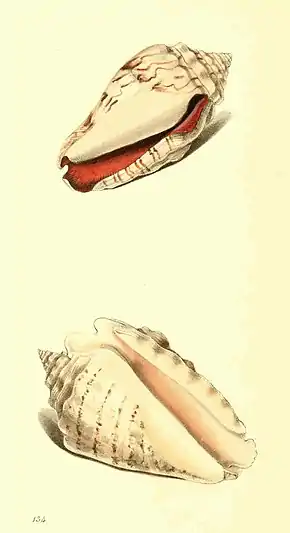
STROMBUS exustus,
Burnt, or Purple-mouthed Strombus—(Upper figure.)
Generic Character.—See Pl. 10.
Specific Character.
- S. testâ nodosâ; labio interiore albo, lævi; labii exterioris inflexi, supra sinuati, intus purpureo-atri, striati; lobo basali edentulo.
- Shell nodulous; inner lip smooth, whitish; outer lip inflected, above sinuated, within striated, blackish purple; basal lobe not toothed.
- Young. S. papilio. Chem. x. t. 158. f. 1510, 11. Dillw. 661. 120. 11.
- Adult. Strombus exustus. Humphreys in Mus. Cal. p. 38. n. 714.
- S. lentiginosus. Martini, iii. t. 80. f. 825, 826. Gmelin. 3510. (var. β.) Dillwyn. 660.
- Seba, t. 52. f. 17. 18. Knorr. 3. t. 26. f. 2. 3?
Specimens now before me prove that the S. papilio of Chemnitz is a young shell of S. exustus, a species named by Mr. Humphreys in the Calonne Catalogue, and described in his own manuscripts. In a young state, the aperture is smooth and nearly white, but when full grown, the outer lip is strongly striated, and the aperture reddish purple, dark red, or reddish chesnut: the outer lip is but slightly sinuated above, and the basal lobe never toothed, as in the next species. Inhabits the island of Haynam, in the East Indies, and is very rare.
Described by Lamarck (Syst. 7. p. 211) under the name of S. Papilio. The first of these names, however, has the right of priority. (See Mus. Cal. 1797.) The figures of Martini, tom. 3. tab. 8. f. 825, 826, clearly represent this species; although Lamarck has quoted them for S. lentiginosus.
STROMBUS lentiginosus,
Tuberculated Strombus
- S. testâ nodosâ; labii exterioris supra rotundati ad spiram annexi, profundè bilobati, margine crasso inflexo, sub-nodoso; lobo basali dentato; aperturâ lævi.
- Shell nodulous, outer lip above rounded, attached to the spire, deeply bilobated, margin thick, inflexed, slightly nodulous; basal lobe toothed; aperture smooth.
- Young. Seba, t. 62. f. 37. 40. optimè. Martini, 3. t. 89. f. 871. t. 91. f. 891. 892? Lister, 893. 12?
- Adult. S. lentiginosus. Gmelin, 3510. Dillwyn. 660. Martini, 3. t. 81. f. 827, 828.
- Seba, 62. f. 11. 30. (optimè.) Lister, 861. 18. Gualt. 32. f. A.
- Lam. Syst. 7. p. 203. Knorr, 3. tab. 13, f. 2. Lamarck has omitted to quote any of the figures representing the young shells of this and the following species.
This common shell requires little description, and is only introduced to contrast more fully the difference between these two species: the upper part of the lip has two deep notches, which form three prominent lobes; the basal lobe is toothed, similar to the Pteroceræ: the aperture (in those shells from the East Indies) is light pink inside. A large and fine variety comes from the Mauritia islands, having the mouth within pale golden yellow.